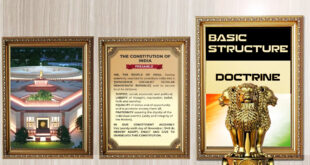A UCC under a majoritarian regime is likely to be an awkward result of the crisis of Indian secularism.
On June 27, in Bhopal, when Prime Minister advocated that a Uniform Civil Code (UCC) be implemented, he was seeking to accomplish the last of the three core ideological agendas that the Bharatiya Janata Party (BJP) has campaigned for years. The abrogation of Article 370 of the Constitution and construction of the Ram Mandir in Ayodhya are the other two. But why is it the BJP so eager to have a UCC while its exclusionary majoritarian ideology considers inequality between the majority and minority population as legitimate? In Bhopal, PM asked: How could it be possible to run a family (the nation) with disparate laws for its different members (communities)? B.R. Ambedkar asked similar questions: Why should Hindu religion have four castes? And why do some caste groups dominate and humiliate others, particularly Dalits? The fate of India’s egalitarian pursuit would ultimately depend on the resolutions of these two inter- twined questions. But the Hindu Right seems to be overenthusiastic about the UCC, and shows no concern for Ambedkar’s question on caste inequalities. Though the Constitution recommends a UCC, the fact is that a UCC has been seen as a communal agenda for a long time. Even well-known, secular public intellectuals have chosen to shy away from taking a clear stand in its favour.
Personal law and gender
India may be moving towards majoritarianism, but the arc of democracy is increasingly bending towards multiculturalism. Many Western liberal democracies, and not just India, are wrestling with the issue of gender equality, which is at the crux of a UCC.
For instance, the French courts deal with such cases that often come from Muslim immigrants from Morocco and Algeria. Canada, Australia, and the U.S. often use religious-based alternative dispute resolutions. India could learn from such efforts.
Another key issue of UCC is Muslim personal law. The All India Muslim Personal Law Board (AIMPLB) came into existence in 1973 mainly to preserve Muslim personal law. But the history of personal law can be traced to as early as 1772, when the colonial state used religious doctrines to formulate personal laws. The Muslim Personal Law (Shariat) Application Act, 1937 and the Dissolution of Muslim Marriage Act, 1939 form the foundation of Muslim personal law. The triple talaq bill, passed in 2019, is one of the recent major changes to personal law.
Some suggest that internal reforms within the community are the way forward, but sadly, there has not been much progress on this score till date. Muslim women activists have been knocking on the doors of community leaders for years for reforms, particularly codification of Muslim personal law. During Nehru’s time, many Muslim countries such as Jordan, Syria, Tunisia, and Pakistan brought about reforms and codified their family laws. These changes were based on The Ottoman Law of Family Rights, 1917. Though Maulana Azad and Humayun Kabir were prominent Muslim leaders at the time in India, no efforts for internal reforms took place. In independent India, the Muslim community leadership has been majorly aligned with secular parties; the community has barely had any independent leadership. Even the Deoband leadership was aligned with the Congress for a long period of time. The indifference shown by secular parties, whether in power or out of it, towards contentious issues such as Ayodhya and UCC has created opportunities for the Hindu Right to set the agenda.
Progress on internal reforms remains insignificant. Many feminists and Muslim women groups who are exhorting for gender justice have been accusing the AIMPLB of being an all-male body ever since the days of the Shah Bano case. Under pressure, the AIMPLB had opened space for women members for whatever its worth. But there is hardly any progress on the codification of family law or on general reform of personal law.
A great clash
For the average Indian political mind, UCC is only three glorious words with an exalted promise of equality of law. So, it does make sense when Opposition parties are asking the government to present a draft. At the same time, these parties have both the resources and the time to prepare their own draft, which could have brought about a qualitative difference to the present debate. It now appears that India is heading for a great clash between Muslim groups such as the AIMPLB and the Indian state on this issue. Groups such as AIMPLB may not be able to influence the Modi government the way they convinced the Rajiv Gandhi government about the Shah Bano case. If the community is mobilised to take to the streets, it will add a new layer to the politics of polarisation, which may give an advantage to the Hindu Right. On the Babri Masjid issue, such a clash took place both on the streets and in court. In the end, it all appeared to be in vain, and the community is living with a deep sense of loss and injustice.
On the relationship between gender justice and Islam, a lot depends on interpretations of the religion and religious texts. While liberal interpretations can be found in various works, such as those by the Moroccan feminist Fatima Mernissi, there are also regressive interpretations, which can be found in the statements of the Taliban, for instance. One only hopes that Muslim groups in India opt for liberal interpretations which ensure gender justice. Whatever be the outcome, a UCC under a majoritarian regime is likely to be an awkward result of the crisis of Indian secularism.
Shariat Law
Sharia law is a set of religious principles that guide the lives of Muslims. It is based on the Quran, the Hadith, and the Sunnah, which are the sacred texts of Islam. Sharia law covers a wide range of topics, including personal law, criminal law, and financial law.
In India, Sharia law is applied to Muslims in matters of personal law, such as marriage, divorce, and inheritance. The Muslim Personal Law (Shariat) Application Act, 1937, gives Muslims the right to be governed by their own personal law. This law is not applicable to Muslims who marry under the Special Marriage Act, 1954.
The application of Sharia law in India has been the subject of some controversy. Some people argue that it is incompatible with the secular nature of the Indian state. Others argue that it is a fundamental right of Muslims to be governed by their own personal law.
The Supreme Court of India has ruled that Sharia law is not incompatible with the Indian Constitution. However, the Court has also ruled that Sharia law cannot be used to violate the fundamental rights of women or other minorities.
The application of Sharia law in India is a complex issue. There are a variety of factors that need to be considered, including the rights of Muslims, the secular nature of the Indian state, and the need to protect the fundamental rights of all citizens.
Here are some of the key aspects of Sharia law that are applied to Muslims in India:
Marriage: Muslims can marry only within their faith. Polygamy is allowed, but only if the husband can provide for all of his wives equally.
Divorce: Divorce is allowed in Islam, but it is a complex process. The husband must give the wife a talaq, or divorce decree. The wife can also seek a divorce through the courts.
Inheritance: Inheritance laws in Islam are based on the principle of equal distribution among the heirs. However, there are some exceptions to this rule, such as the right of the husband to take a larger share of the inheritance than the wife.
Charities: Muslims are required to give to charity, or zakat. The amount of zakat that is due is based on a person’s income.
Sharia law is a complex and evolving system of law. The application of Sharia law in India is subject to the Indian Constitution and the Supreme Court’s rulings. However, Sharia law continues to play an important role in the lives of Muslims in India.
 Chinmaya IAS Academy – Current Affairs Chinmaya IAS Academy – Current Affairs
Chinmaya IAS Academy – Current Affairs Chinmaya IAS Academy – Current Affairs



